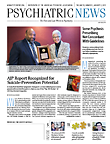As we uncover more details about the molecular and genetic factors that influence mental health, do we risk dehumanizing the patients who live with these conditions?
A new study from Yale University suggests that such a notion may be something to consider, as therapists tended to show less empathy toward people when reading case descriptions using biological explanations compared with psychosocial ones; the biological explanations also lowered the belief that psychotherapy would be an effective treatment.
These results, published in the Proceedings of the National Academy of Sciences, counter some beliefs that appreciating the biology and genetics of a mental disorder may lower perceptions of blame and accountability and therefore improve empathy for patients.
“Empathy is a critical component of the therapeutic alliance between a treatment provider and a patient, to the point that more empathy on the part of a therapist is associated with improved treatment outcomes,” said Matthew Lebowitz, a graduate student in psychology at Yale who led the research, which he cowrote with Woo-kyoung Ahn, Ph.D., a professor of psychology.
Lebowitz and Ahn developed a series of patient vignettes for four mental disorders: social phobia, schizophrenia, major depression, and obsessive-compulsive disorder. The conditions were chosen to run the gamut in terms of how biologically construed they are; for example, previous research has shown that mental health professionals view schizophrenia in highly biological terms, whereas they view social phobia as having less of a biological basis.
The researchers created two vignettes for each disorder—one with a biological explanation, the other with a psychosocial explanation. A national sample of mental health professionals including psychiatrists, psychologists, social workers, and others was recruited to review the cases and rate their feelings about the patients.
For all four disorders, the therapists reported feeling less empathy after reading the biologically based vignette, and this held true regardless of whether the therapist was medically trained.
As a control measure, part of the rating system measured distress, but these levels generally did not differ between the two types of explanations, so the higher empathy for the psychosocial stories was not simply due to the descriptions being more upsetting.
In addition, the type of description influenced how the professionals would treat a patient, as therapists tended to believe psychotherapy would be less effective than medication when reading a biologically based vignette.
“We should stress that these results do not suggest that understanding the biology of a mental disorder is a bad thing,” Lebowitz told Psychiatric News. “Advances in neuropsychiatry and genetics have been revolutionizing the field, but it’s very important for everyone, including researchers, patients, and the general public, to appreciate that biology does not exist in a vacuum.”
To examine biological descriptors in a more plausible real-world scenario, Lebowitz and Ahn designed a third reading study using social phobia and depression cases that contained both biological and psychosocial descriptions—though one of the two would predominate. They identified the same pattern in these vignettes, since the descriptions that were more biologically based resulted in less empathy and a stronger preference for medication treatment.
Lebowitz noted that all the studies measured empathy only in relative terms and that therapists may still maintain high levels of absolute empathy even when reading biological explanations. However, as biological data gain influence in diagnosing patients or considering treatment, the findings do hint at a potential slippery slope in doctor-patient relationships.
“The question to address is how we take what scientific advances offer us, without running the risk of starting to view patients as malfunctioning machines,” Lebowitz said.
This work was supported by a grant from the National Institutes of Health. ■
An abstract of “Effects of Biological Explanations for Mental Disorders on Clinicians’ Empathy” can be accessed
here.
